Whether you’re a newbie or a seasoned pro, you’ve probably made some of these common enterprise SEO mistakes. And maybe you’ve even fallen into a habit with some of them.
For example, using outdated tactics (that worked great three years ago) or not focusing on the right keywords can lead to poor search engine rankings and lower traffic.
But don’t be discouraged!
In this post, we’ll go over the top 10 enterprise SEO mistakes and show you how you can optimize your efforts to better achieve your business goals.
Don’t Fall for the Myth of One True Metric for Search Queries
There’s a popular misconception that there’s one perfect metric that will unlock the secret to success. However, relying too much on a single metric can actually be harmful to your business.
Google used to provide the same answer to everyone searching for a particular term, but things have changed. Today, search results are personalized based on factors like your location and search history.
This means that even widely used tools like Keyword Planner can be misleading, as they might not accurately reflect the true competition and search volume for a particular keyword:

What’s more, focusing solely on one-time metrics or outdated tactics is a major enterprise SEO mistake. Keywords and search trends are constantly changing, so it’s crucial to stay up to date on the latest best practices and to focus on the metrics that really matter, like ROI, bounce rate, page speed, organic traffic, and content scores, to name a few.
Learn More: Enterprise Local SEO: How It Works and Why It’s Important/sg_alert]
10 of the Most Common Enterprise SEO Mistakes
Now, let’s go through the most common mistakes enterprises are making with their SEO — and how to fix them.
1) Having Unclear Goals
One of the most common mistakes experts make in enterprise SEO is not setting proper goals for their strategies. Every SEO strategy should have a clear and specific goal, whether it’s to increase website traffic, generate quality leads or boost organic sales.
Understanding your campaign’s goals from the beginning will prevent confusion and wasted efforts. However, it’s unlikely that one strategy or campaign can achieve all these goals simultaneously. To succeed, it’s necessary to divide your goals and focus on them one at a time.
Setting measurable goals and key performance indicators (KPIs) should be the first step for SEO experts. When you have clear goals, it becomes easier to compare outcomes and adjust your strategy accordingly.
Most enterprise companies focus on traffic before generating leads. By taking this approach, you can build traction on your website before implementing a lead-gen strategy. This will help you achieve better results and ensure that your SEO strategy aligns with your organization’s needs by prioritizing and focusing on specific goals.
2) Skipping an In-Depth SEO Audit
Audits are a crucial step for enterprises looking to improve their website’s ranking and succeed in a competitive digital landscape.
These audits examine various aspects of your site’s SEO health, such as:
- Technical optimization
- Loading speed
- Content quality
- User experience
- Conversion rates
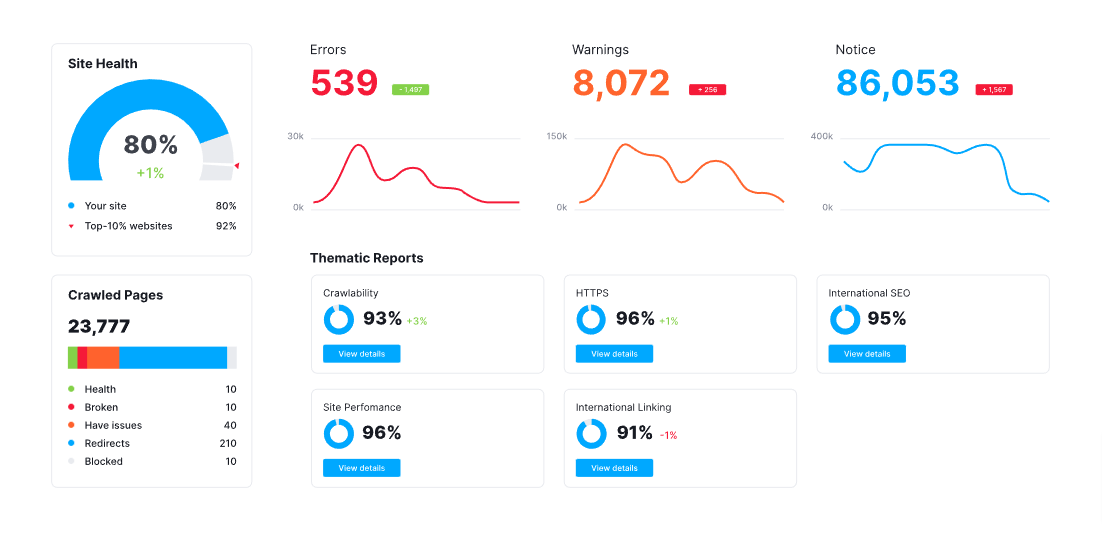
By conducting an in-depth audit with a tool or data source like Semrush, you can identify areas that need improvement to boost your website’s position in the SERPs. For example:
- Technical health is an essential aspect of these audits as it ensures that Google can find your website by reviewing robots.txt and the XML sitemap, and checking for crawl errors and backlink profiles.
- Content assessment is another crucial aspect of enterprise SEO audits, as not all content is created equal.
- User experience and conversion rates are also reviewed, to make sure your website is easy to navigate and user-friendly.
While these audits can be time-consuming, they are well worth the investment for businesses looking to optimize their SEO strategies.
By identifying and addressing any issues affecting your website’s performance and keyword rankings, you can set your business up for sustained success in the long run.
[sg_alert type="warning"]Dive Deeper:* How to Do an Enterprise SEO Audit
* How to Fix 15 Common On-Site Technical SEO Issues
3) Ignoring Duplicate Content Issues in SEO
Multiple URLs with similar content on your website can cause significant problems with Google indexing duplicate pages. Poor redirection practices can negatively affect your website’s ranking as a result.
Keep in mind that if Google finds duplicate content on a page, it will index one version and ignore the other. It’s crucial to conduct an in-depth SEO audit to identify and tag pages with similar content.
For example, take a look at the following URLs:
https://example.com/article-on-veggies/
http://example.com/article-on-veggies/
https://www.example.com/article-on-veggies/
http://example.com/article-on-veggies/1/
As you can see, all the above pages have the same content, but different URLs. But by adding a canonical tag to all these pages except the top one (the main page), you can easily signal to the search engines that they are all variations of a single, original page.
So all the above pages except the top one should have the following canonical tag:
<link rel=”canonical” href=”http://example.com/article-on-veggies/” />
Which will indicate to Google that they are all copies of the main page which, in this case, is the first one.
The good news is that by addressing these issues during your audit, you can optimize your website’s performance and improve its ranking in search engines. This can ultimately lead to more traffic and growth for your business.
Dive Deeper: Beginner’s Guide to Properly Using Rel Tags to Improve Your Site’s Rankings
4) Not Aligning with Broader KPIs and Goals
Enterprise SEO is a complex and multifaceted field that requires clear goals and metrics to succeed. Without specific targets, SEO tactics can easily become unfocused, wasting valuable time and resources.
Also, implementing technical and on-page updates can be a slow process, especially when trying to deploy new content.
To avoid these issues, define specific key performance indicators that tie into broader business goals. Some of the most important KPIs for enterprise SEO include increasing organic search traffic, improving rankings for specific keywords and driving conversions and revenue from organic search.
Here is an example of KPIs for B2B enterprises:
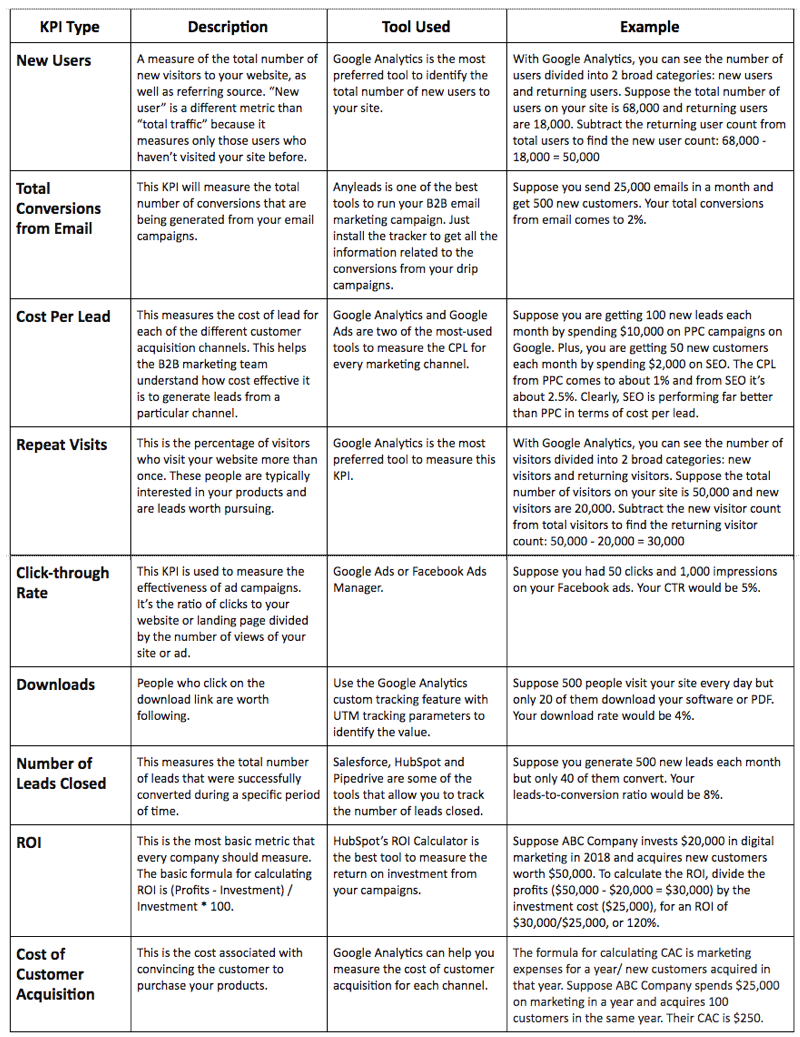
By connecting SEO goals with broader business objectives and communicating the value of SEO to different stakeholders, you can ensure that they align your enterprise SEO strategies with the needs of the organization as a whole.
This will help keep your efforts focused and ensure that your Enterprise SEO efforts are delivering the results that matter most to your organization.
5) Taking the Title and Meta Description for Granted
They might seem like small potatoes, but your title and meta description count for a lot. They really drive traffic to your website.
Here are some of the negative consequences of neglecting your page titles and meta descriptions:
- You may lose traffic and rankings if Google doesn’t understand the purpose of your page.
- Potential visitors may perceive your website as less trustworthy and less professional.
- Having less appealing pages may lead to fewer clicks and engagements.
- Search engine results can make it harder for your website to stand out, affecting your ability to compete.
- The potential to attract new customers and grow your business may be lost if you miss out on these opportunities.
To improve your Enterprise SEO, focus on some simple yet critical steps, such as making sure each page has its own unique and descriptive title (aka SEO page title, aka title tag) that helps Google understand its purpose.
Descriptive tags also make them more likely to be clicked on when shared. If you’re concerned about branding, you can include your name at the end of the title:

Meta descriptions are also vital and should be custom-written for each page. They act as 160-character elevator pitches to attract your target audience.
If you don’t write a custom description, most content management systems will pull the first paragraph of your content to display as the description on search results. However, your opening paragraph may not be optimized to catch the eye of someone scrolling through the results.
So don’t overlook these easy opportunities for enterprise SEO success. Take the time to study every page of your website and ensure that each has its own unique and specific SEO title tag and meta description:
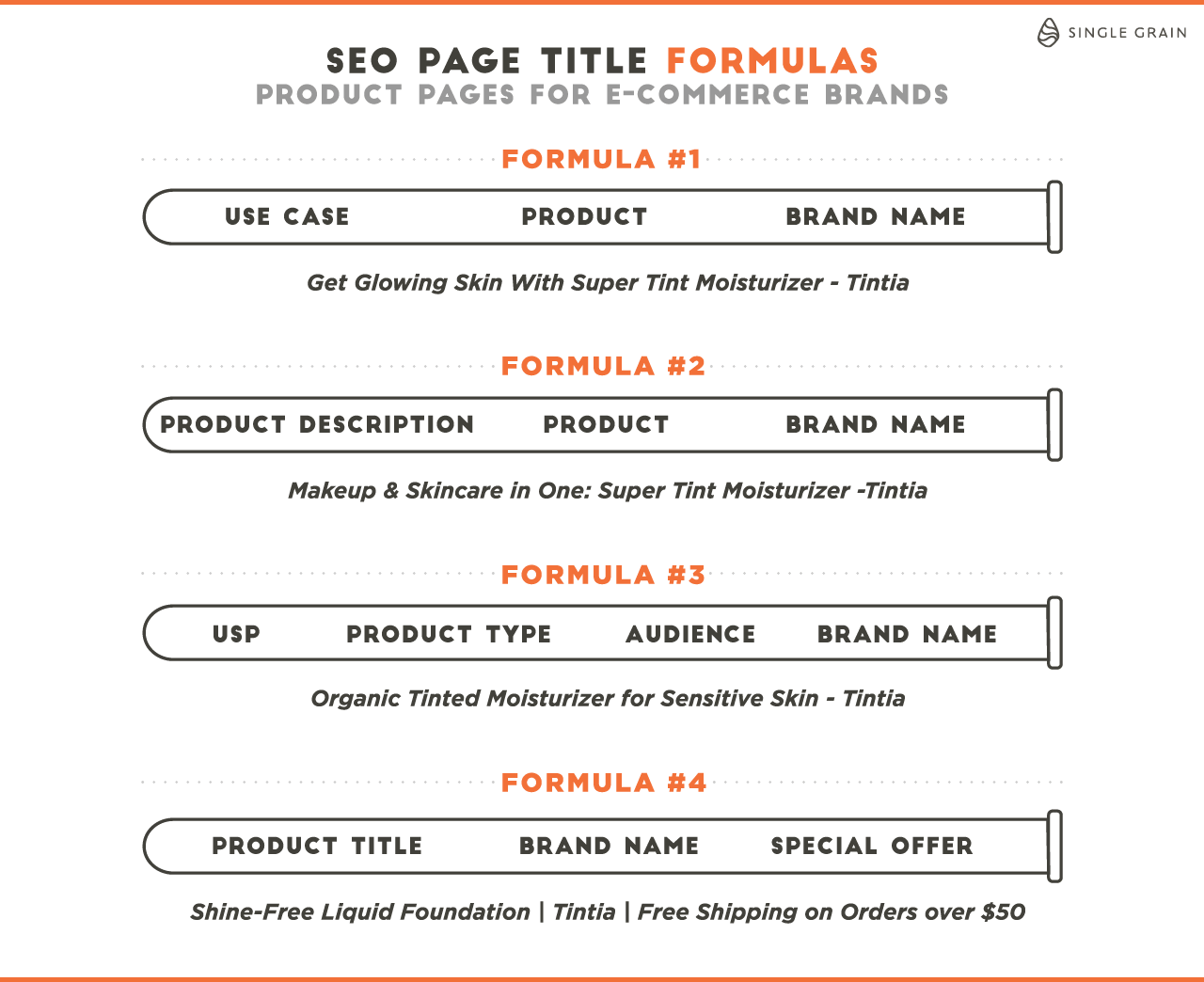
Dive Deeper: How to Write a Strong SEO Title Tag (with Formulas & Templates!)
6) Prioritizing Over-expansion vs. Optimization
Most enterprise websites have a long history and are large. Content publishing, product launches, website redesigns and migrations usually take years. This can lead to confusion, especially when different teams have worked on the site at different times.
Keeping track of indexed pages in Google Search Console and maintaining the sitemap.xml file are two ways to manage this:
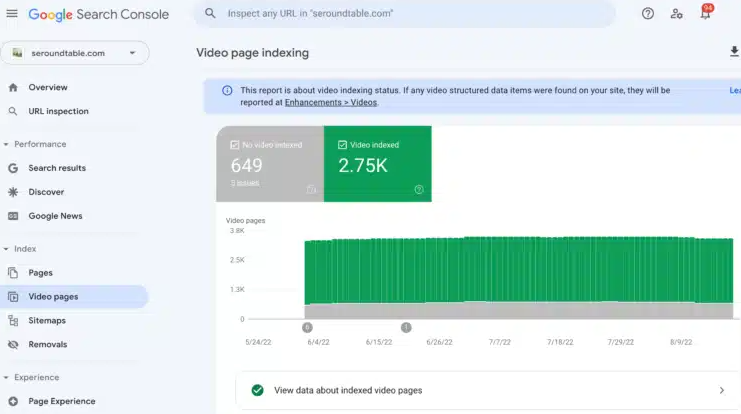
Occasionally, high-value keywords arise, and considerable resources are invested in creating new content when older pages on the same topic exist. A good content update — rewriting, optimizing and republishing — of your older pages would have saved both time and effort.
A legacy page might also have years’ worth of backlinks and internal links pointing to it. The domain authority of these pages can improve their chances of ranking thanks to their refurbishment and optimization.
Refurbishing site sections and legacy content will prevent website bloat. When using keyword reporting, storing target keywords with preferred landing pages can help avoid reinventing the wheel and maximize existing keyword coverage.
Dive Deeper: Why You Should Update Content – Or Risk Losing The Traffic You Have [Case Study]
7) Not Optimizing Channels
Enterprise companies invest in multiple channels, including SEO, paid search, social media and syndication. In general, SEO has a lower acquisition cost than other channels.
Enterprise brands, however, should use multiple channels to scale their marketing efforts effectively. There’s no way organic search can carry the load by itself. It can be detrimental to enterprise SEO to ignore other channels.
In fact, studies show that brands with an omnichannel strategy retain an average 89% of their customers, whereas just 33% of brands without such a strategy do:
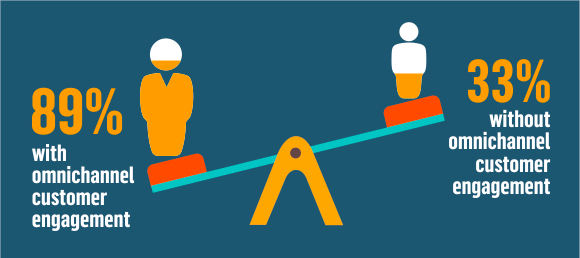
Amazon and other non-traditional search engines have expanded SEO beyond traditional ones. This has led to an increase in vertical search optimization. So if you want to make sure you set things up for success, remember a demand generation strategy should include SEO.
Through opportunity forecasting, you can identify areas of your keyword strategy where your brand can compete effectively in organic searches, as well as areas that may benefit from a paid search campaign:
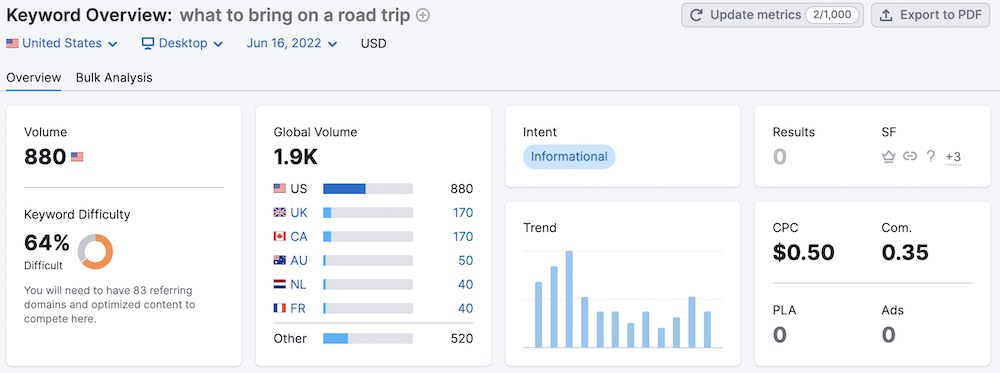
Enterprise-level brands can achieve their demand generation goals more efficiently and effectively by leveraging multiple channels and tools.
Dive Deeper: Why You Should Use Multiple Channels to Maximize Your Customer Acquisition
8) Overemphasizing Indicator Metrics
When you hear the term “Enterprise SEO,” you likely think of:
- Keyword performance
- Website rankings
- Traffic
- Conversions
Although these metrics are important, it’s crucial to understand what drives conversions and what the return on investment is. The level of investment in SEO can be difficult to justify to stakeholders without answers to these questions.
Engage your executive audience with the most critical metrics or business drivers SEO can impact. Showing how SEO efforts relate to broader business objectives highlights SEO’s value. Later, you can dig deeper into the SEO-specific indicator metrics on other pages, tabs or conversations.
So provide an executive summary or lead with the results of your amazing solution to provide stakeholders with a clear and concise summary report:
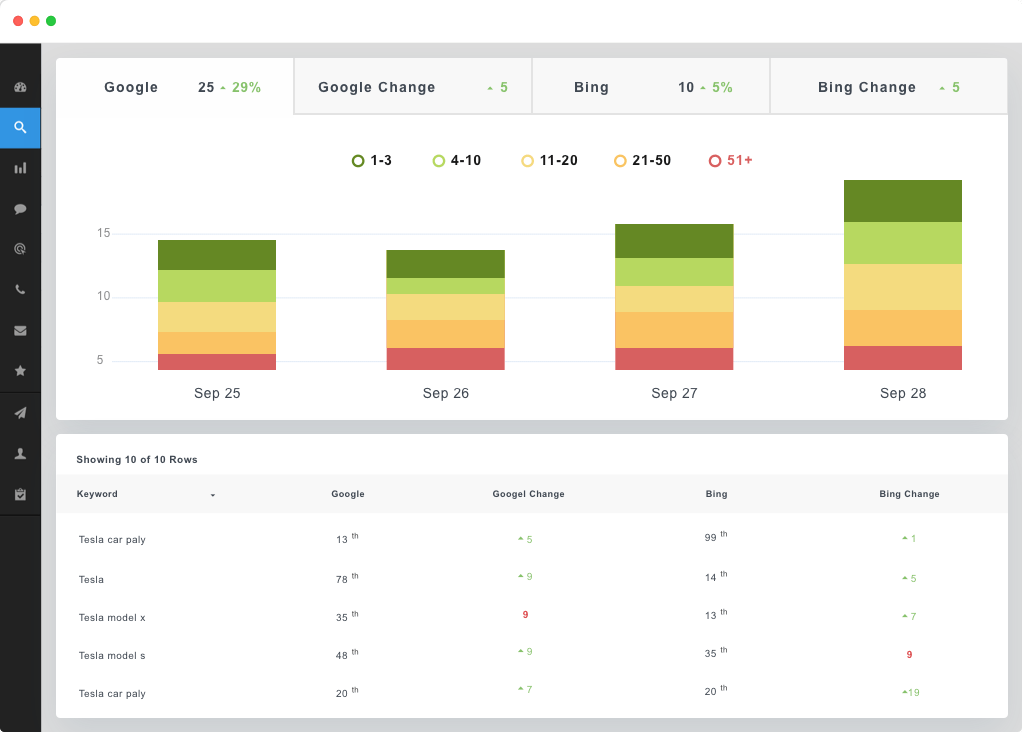
Then, you can go deeper into the “how” you achieved those results in an appendix or separate part of the SEO report. By communicating the value of your Enterprise SEO efforts, you can keep stakeholders engaged and invested.
Dive Deeper: 10 Underrated SEO Reporting Metrics That’ll Impress Your Clients in 2023
9) SEO Data Without Insight
Stakeholder reports should go beyond simply presenting raw SEO data. Instead, tell a compelling story that ties the strategy to the results.
Without proper context and interpretation, SEO data can be misinterpreted or frustrating. The context and explanation of the data can inspire others to care and take action.
It’s not enough to show a few percentage increases or decreases when reporting performance. Instead, your SEO report should emphasize key insights and ideas that will drive future success. Regardless of how things are going, it’s important to dig deeper into what’s driving performance and what can be done to improve it.
Most SEO tools you use, including Google Analytics, can provide a wide array of specific reports:
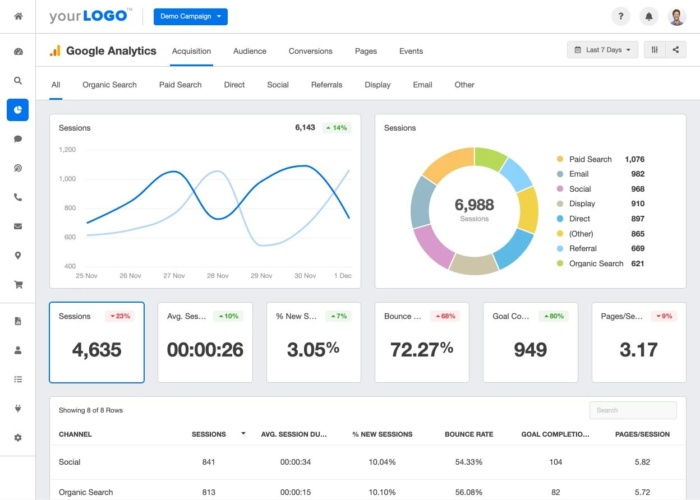
Instead of being a disconnected activity, SEO reports should be an opportunity for collaboration and strategic planning. When you share insights and ideas in your SEO reports, presentations, or conversations, you can go beyond raw data and focus on what really matters.
Ultimately, when reporting on SEO performance, it’s important to think beyond the numbers and focus on insights and smart thinking that can drive future success. Using a compelling story and framing the context can motivate others to act and achieve better results.
Dive Deeper: 8 Essential SEO Reports to Create for Your Client
10) Results Aren’t Linked to Objectives
In order to tell a good story, you need a logical sequence of events that leads to a satisfying ending. Your SEO report should demonstrate the value of your efforts, so it’s important to explain how your efforts contributed to your results.
Reporting on the outcome, even if it’s positive, won’t necessarily link it to SEO. Tie each reported KPI to something you intentionally did to achieve it, like technical fixes, new content or a change in strategy.
You may want to consider titling your dashboards according to the objective they’re linked to instead of the result metric.
For instance, instead of “Monthly Conversion Rate,” you could use “Conversion Rate from Website Redesign Project.” This provides context and ties the reported metric to the specific SEO efforts that achieved it.
Enterprise SEO Mistakes: Wrapping Up
SEO mistakes can be costly, both in terms of time and resources, for enterprises. You can hinder your SEO efforts and prevent your business from reaching its goals if you make some of these common errors, particularly unknowingly.
There’s no shame in making mistakes, only in failing to fix and learn from them.
Make it a habit to audit your enterprise site regularly so that you don’t fall into any bad habits over time.
If you’re ready to improve your enterprise SEO strategy, Single Grain’s enterprise SEO experts can help.👇



